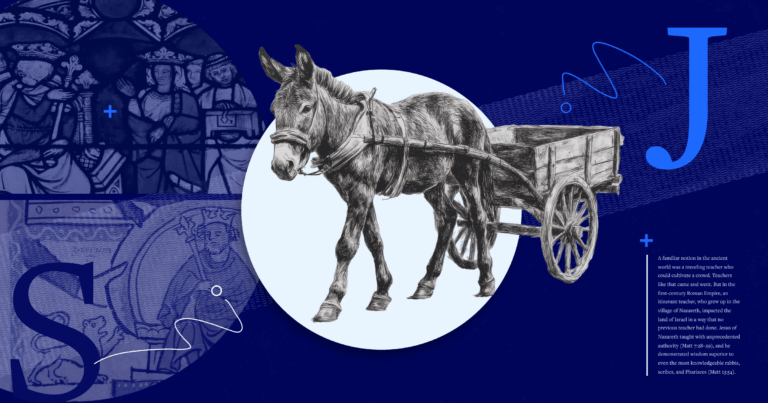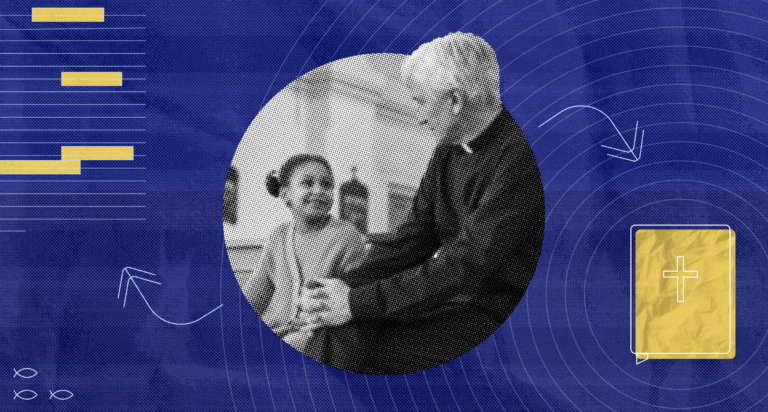
A familiar notion in the ancient world was a traveling teacher who could draw a crowd. Teachers like that came and went. But in the first-century Roman Empire, an itinerant teacher, who grew up in the village of Nazareth, impacted the land of Israel in a way that no previous teacher had done. Jesus of Nazareth taught with unprecedented authority (Matt 7:28–29), and he demonstrated wisdom superior to even the most knowledgeable rabbis, scribes, and Pharisees (Matt 13:54).
In Israel’s history, there was a great king whose reputation outstretched the promised land and drew the masses. King Solomon was the wisest of kings and men. But as great as Solomon’s wisdom was, Jesus surpassed him.
The four Gospels depict Jesus as a true and greater Solomon, and we should believe their portrayal. In this article, we will consider four ways that the shadow of Solomon is present in the life and ministry of Jesus.
Table of contents
- Gifts from Gentile lands
- A shocking claim of greatness
- Wise answers and unmatched teaching
- Riding a donkey into Jerusalem
Conclusion
1. Gifts from Gentile lands
Sometime after the birth of Jesus, Gentiles from the east came to visit him. The wise men arrived in Jerusalem because they knew that was the city where a king ruled. They asked, “Where is he who has been born king of the Jews? For we saw his star when it rose and have come to worship him” (Matt 2:2). In short order, the magi learned what the Old Testament prophesied: the promised king would be born in Bethlehem, so to Bethlehem they went (2:3–9).
Arriving at the appropriate house in Bethlehem, the magi opened the gifts they had brought him: gold and frankincense and myrrh (Matt 2:10–11). These three gifts might seem like strange things to bring to a small child, but the gifts symbolized the devotion and deference of the magi, as well as the royal status they believed the child possessed. They bowed before the king (2:11).
The echo of 1 Kings 10 is heard in this magi scene. According to 1 Kings 10:1–10, the queen of Sheba came to Solomon with gifts. She had come to see and hear this great and wise king. An entourage had accompanied her. She brought “spices and very much gold and precious stones” (1 Kgs 10:2). She “gave the king 120 talents of gold, and a very great quantity of spices and precious stones. Never again came such an abundance of spices as these that the queen of Sheba gave to King Solomon” (10:10).

Gain insights on the New Testaments’s use of the Old Testament using the Important Passages in Logos’s Guides.
Psalm 72 further establishes a connection between Solomon and the future Christ, in terms of gifts of devotion and status-recognition. This psalm is either written by David for Solomon, or it is written by Solomon. No matter if the author is David or the son of David, the content of Psalm 72 has in view the covenant promises of a king who would reign forever (see 2 Sam 7:12–13), and such a king would receive the gifts and worship of others. For example, Psalm 72:10 says, “May the kings of Tarshish and of the coastlands render him tribute; may the kings of Sheba and Seba bring gifts!” And Psalm 72:15 says, “Long may he live; may gold of Sheba be given to him!” These lines from Psalm 72 are about Gentiles bringing gifts that include gold, and such homage was evident in the lives of Solomon—and Jesus.
Matthew 2 echoes these royal gifts from Gentiles in 1 King 10 and Psalm 72. The point: Jesus is a Solomonic figure.
Thirty years before his public ministry, his status was recognized and revered by Gentiles. Not even Solomon’s greatness was acknowledged so early.
2. A shocking claim of greatness
Second, Jesus himself claimed to be greater than Solomon.
Throughout Jesus’s ministry, he taught a variety of truths about the kingdom’s presence (Matt 4:17), people (Matt 5:3–16), ethics (Matt 5:17–7:14), and future (Matt 24–25). He also taught about himself—making claims about his origin and identity. His claims included, “I am the living bread that came down from heaven” (John 6:51); “I am the light of the world” (John 8:12); “I am the good shepherd” (John 10:11); “Something greater than Jonah is here” (Matt 12:41); and “Something greater than the temple is here” (Matt 12:6).
Jesus’s many claims did not permit his hearers (and now readers) to conclude that he was simply a good human teacher. His claims signaled much more than that. For instance, in Matthew 12, Jesus made a claim about himself that invoked Solomon’s name. He was talking to some scribes and Pharisees (Matt 12:38) about the future judgment upon his generation. He said, “The queen of the South will rise up at the judgment with this generation and condemn it, for she came from the ends of the earth to hear the wisdom of Solomon, and behold, something greater than Solomon is here” (Matt 12:42).
The “queen” in Jesus’s words was the queen of Sheba in 1 Kings 10. She came to hear Solomon’s great wisdom, because his reputation for wisdom had reached the ears of people outside the promised land. The reason for Solomon’s great wisdom was God’s answer to the king’s prayer. The Lord had told him, “Ask what I shall give you” (1 Kgs 3:5), and Solomon replied, “Give your servant therefore an understanding mind to govern your people, that I may discern between good and evil” (3:9). The Lord gave Solomon “a wise and discerning mind,” telling him that “none like you has been before you and none like you shall arise after you” (3:12).
The Lord’s language emphasized the distinctiveness of Solomon. There was no past, present, or future ruler who could match the superiority of the king’s wisdom. The biblical author says that Solomon’s wisdom and understanding were “beyond measure” (1 Kgs 4:29), and his wisdom “surpassed the wisdom of all the people of the east and all the wisdom of Egypt” (4:30). Solomon was not only Israel’s wisest king, but the language in 1 Kings 3:12 indicates that he was the world’s wisest king.
Jesus claimed to be greater than the wisest king the world had ever known. The sheer magnitude of the claim is staggering.
Imagine the surprise, then, when Jesus says, “Behold, something greater than Solomon is here” (Matt 12:42). He does more than compare himself to Solomon; he claims to be greater. But greater in what way? Jesus’s words refer to the queen of the South who came to hear Solomon’s wisdom (12:42), so wisdom is the feature of Solomon that Jesus has in mind.
Talking to scribes and Pharisees in Matthew 12, Jesus claimed to be greater than the wisest king the world had ever known. The sheer magnitude of the claim is staggering. The implication was that Solomon was no longer the wisest man who had ever lived. Jesus was a greater Solomon.
3. Wise answers and unmatched teaching
Third, Jesus demonstrated his surpassing wisdom to others.
Anybody can make claims, but not everybody can substantiate the claims they make. Solomon’s wisdom was evident to people who came to him with questions, and this Solomonic shadow is present in the ministry of Jesus.
In 1 Kings 3:16–28, Solomon solved a dispute between two women regarding a child. When all Israel heard of Solomon’s judgment, “they stood in awe of the king, because they perceived that the wisdom of God was in him to do justice” (1 Kgs 3:28). As Solomon’s reputation of great wisdom extended beyond the land of Israel, “people of all nations came to hear the wisdom of Solomon, and from all the kings of the earth, who had heard of his wisdom” (4:34). The queen of Sheba told Solomon “all that was on her mind” (10:2), and he “answered all her questions; there was nothing hidden from the king that he could not explain to her” (10:3).
Solomon’s wisdom, then, was not only something he personally possessed, it was also something he publicly demonstrated. So too the public demonstration of wisdom characterized the ministry of Jesus, and in this way the echo of Solomon’s greatness is discernible.
People approached Jesus with all kinds of questions, though sometimes the questioner had dishonorable motives. For example, during Passion Week, some of the Pharisees and Herodians approach him “to trap him in his talk” (Mark 12:13). Despite the evil motives of some of the leaders, Jesus answered questions and avoided their traps.
He taught boldly and with authority, sometimes leaving the listeners astonished. After the sayings comprising the Sermon on the Mount (Matt 5–7), the author says, “The crowds were astonished at his teaching, for he was teaching them as one who had authority, and not as their scribes” (Matt 7:28–29). Some officers once told the Pharisees, “No one ever spoke like this man!” (John 7:46).
The wisdom of Jesus was evident before his public ministry. According to Luke 2:41–52, Jesus remained in Jerusalem after Mary and Joseph departed with a caravan back to Nazareth. When they eventually located him, they found him “in the temple, sitting among the teachers, listening to them and asking them questions. And all who heard him were amazed at his understanding and his answers” (Luke 2:46–47). The biblical author tells us that Jesus “increased in wisdom and stature and in favor with God and man” (2:52).
During Jesus’s ministry, his wise and authoritative words were both compelling and divisive. Crowds were astonished. Religious leaders were angry. Sometimes his words left them speechless. In Matthew 22:46, “No one was able to answer him a word, nor from that day did anyone dare to ask him any more questions.”
4. Riding a donkey into Jerusalem
Fourth, Jesus rode a donkey to Jerusalem as a sign of his kingship.
The event of Jesus’s procession to Jerusalem was Sunday of Passion Week, and he rode a donkey in fulfillment of Scripture. According to Matthew 21:4–5, Jesus’s famous ride fulfilled Zechariah 9:9, which was a prophecy about Jerusalem’s king coming into the city mounted on a donkey.
But the picture of a king on a donkey did not appear for the first time in Zechariah 9:9. There is a story about Solomon that precedes it.
In 1 Kings 1, David is near death, and his son Adonijah wants to seize the throne (1 Kgs 1:5–10). David makes clear that Adonijah would not be the next king; rather, Solomon—the son of David—was the heir to the throne. David gives orders to several men (Zadok, Nathan, and Benaiah):
Take with you the servants of your lord and have Solomon my son ride on my own mule, and bring him down to Gihon. And let Zadok the priest and Nathan the prophet there anoint him king over Israel. Then blow the trumpet and say, “Long live King Solomon!” You shall then come up after him, and he shall come and sit on my throne, for he shall be king in my place. (1 Kgs 1:33–35a)
So Solomon rode David’s mule to Gihon, which was a water source near Jerusalem. This ride by David’s son was a demonstration of his kingship, and his route was accompanied by the shouts and acclamations of the people. Zadok the priest anointed Solomon, the trumpet blasted, and people said, “Long live King Solomon!” (1 Kgs 1:39). The music and rejoicing was so great “that the earth was split by their noise” (1:40).
This ride by David’s son would one day be surpassed by David’s greater son. On the first day of Passion Week, Jesus rode a donkey to Jerusalem, the city of the king.
Like the first Solomon, Jesus rode to reign. He had come to save, to fulfill his mission of enthronement.
The words and actions of the crowd accompanied his ride. People spread cloaks and tree branches on the road (Matt 21:8), and the crowds shouted, “Hosanna to the Son of David! Blessed is he who comes in the name of the Lord! Hosanna in the highest!” (Matt 21:9). By declaring Jesus to be the “Son of David,” they were not equating him with the ancient king who rode his father’s mule. They were making an even greater statement. Jesus was the promised Son of David—the Christ (2 Sam 7:12–13).
Like the first Solomon, Jesus rode to reign. He had come to save, to fulfill his mission of enthronement. As the true and greater Solomon, Jesus’s enthronement would be through his suffering and death and resurrection, so that his ascension as king would be to possess an authority and rule that would never end.
Conclusion
This series of connections between Solomon and Jesus are not exhaustive, but they demonstrate the intention of the Gospel writers to depict Jesus in ways that remind us of Solomon’s life and reign. We are meant to discern such echoes. They illuminate things Jesus said and did, as well as things said to and about him.
The Solomonic shadow in Jesus’s life and ministry is something the very first verse of the New Testament prepares us to see. Matthew describes the first Gospel as “The book of the genealogy of Jesus Christ, the son of David, the son of Abraham” (Matt 1:1). The phrase “son of David” thus signals to us that we can expect a story about David’s son, the long-awaited Christ. Echoes from Solomon’s life connect to this Christological hope, and they are consistent with the New Testament’s opening verse.
Mitch Chase’s suggested resources for further study
Walking the Way of the Wise: A Biblical Theology of Wisdom (Essential Studies in Biblical Theology | ESBT)
Save $5.01 (19%)
Price: $20.99
-->Regular price: $20.99
Typology: Understanding the Bible’s Promise-Shaped Patterns; How Old Testament Expectations are Fulfilled in Christ
Save $2.00 (5%)
Price: $37.99
-->Regular price: $39.99
40 Questions about Typology and Allegory (40 Questions Series)
Save $7.20 (30%)
Price: $16.79
-->Regular price: $23.99
Related articles
- How Old Testament Typology Reveals Shadows of Salvation
- What’s Typology? Patterns of Creation in Redemptive History
- The Christological Tie that Binds Song of Solomon to the Canon
- Seeing Christ in Job: An Exercise in Typological Reading
- The Christological Character of Typological Reading


 2 weeks ago
17
2 weeks ago
17










 English (US) ·
English (US) ·